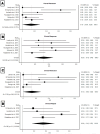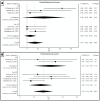Fecal Microbiota Transplantation for Chronic Pouchitis: A Systematic Review and Meta-Analysis
- PMID: 39770634
- PMCID: PMC11676736
- DOI: 10.3390/microorganisms12122430
Fecal Microbiota Transplantation for Chronic Pouchitis: A Systematic Review and Meta-Analysis
Abstract
Pouchitis is a common complication after ileal-pouch anal anastomosis in patients with medically refractory ulcerative colitis. There has been a lack of high-level evidence focusing on the safety and efficacy outcomes of fecal microbiota transplantation (FMT). We aim to evaluate outcomes and complications of fecal microbiota transplantation (FMT) for chronic pouchitis. Databases were systematically searched to retrieve English-only, original studies, published from inception to 31 March 2024, investigating chronic pouchitis only. Primary outcomes included overall remission, clinical response, remission, relapse, and complications. Seven studies with 94 patients were included. The pooled overall remission rate was 15% (95% CI: 0-29%, p < 0.001), the clinical response rate was 33% (95% CI: 19-46%, p = 0.14), the clinical remission rate was 14% (95% CI: 19-46%, p < 0.001), and the clinical relapse rate was 36% (95% CI: 16-55%, p = 0.11). The pooled proportion of patients with mild adverse events after FMT treatment was 39% (95% CI: 6-71%, p < 0.001). No severe adverse events or deaths were reported. Although FMT is an effective treatment for chronic pouchitis, there is still a high rate of mild adverse events. High-level evidence for FMT is still sparse, limiting recommendations for clinical use.
Keywords: FMT; IBD; fecal microbiota transplantation; inflammatory bowel disease; pouchitis; ulcerative colitis.
Conflict of interest statement
The authors declare no conflicts of interest.
Figures




References
-
- Segal J.P., Ding N.S., Worley G., Mclaughlin S., Preston S., Faiz O.D., Clark S.K., Hart A.L. Systematic review with meta-analysis: The management of chronic refractory pouchitis with an evidence-based treatment algorithm. Aliment. Pharmacol. Ther. 2017;45:581–592. doi: 10.1111/apt.13905. - DOI - PubMed
-
- Selvig D., Piceno Y., Terdiman J., Zydek M., Umetsu S.E., Balitzer D., Fadrosh D., Lynch K., Lamere B., Leith T., et al. Fecal Microbiota Transplantation in Pouchitis: Clinical, Endoscopic, Histologic, and Microbiota Results from a Pilot Study. Dig. Dis. Sci. 2020;65:1099–1106. doi: 10.1007/s10620-019-05715-2. - DOI - PubMed
Publication types
LinkOut - more resources
Full Text Sources

